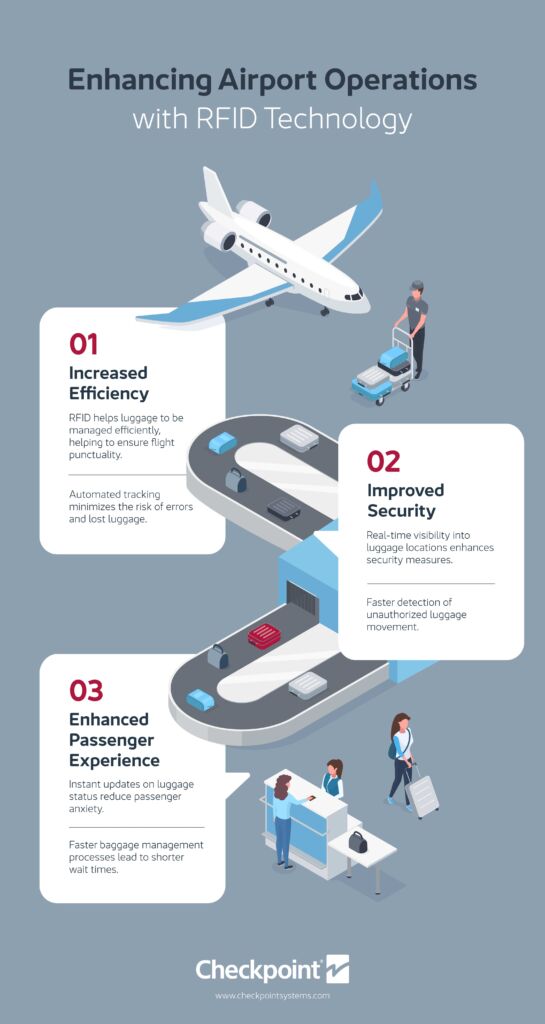At airports, efficiency and precision are paramount. In this sense, incorporating RFID technology has marked a significant revolution, especially in baggage tracking.
In this article, we will delve into how RFID technology is transforming baggage handling processes, its benefits, and its impact on both passengers and the aviation industry.
How does RFID work in baggage handling?
To implement this technology, it is important to understand what is rfid. The technology uses radio waves to wirelessly identify and track objects. In airports, RFID labels are placed on luggage, containing information that allows for unique identification of the passenger, origin, and destination of that suitcase. These tags emit radio signals that are captured by strategically located RFID readers throughout the airport, enabling real-time tracking of luggage as it moves through some checkpoints, such as check-in counters, conveyor belts, and loading areas.
Unlike traditional barcode systems, RFID does not require the tag to be in direct line of sight, allowing for faster and more accurate identification of luggage even in environments with high density of people or baggage. Additionally, RFID tags are more durable than barcodes, reducing the likelihood of damage or loss during transit, and allowing for unique identification of each piece of luggage headed to the aircraft's cargo holds.
In a world where luggage management and tracking are increasingly complex, having suppliers who design suitable tags for specific environments is crucial. Bunker Inlay has been developed precisely to address this need, particularly in airport settings with a rapid growth in passenger numbers forecasted over the next 10 years. This inlay, adaptable to any required format to become a luggage tag, offers a unique combination of reliability and exceptional performance. Backed by compliance with the stringent requirements of IATA and ARC U specification, Checkpoint's Bunker Inlay ensures effective luggage tracking through RFID in the airport sector, providing a robust and reliable solution in a market where each mishandled item poses a significant challenge.
Benefits of RFID in baggage handling
One of the most common problems in airports is lost luggage, which causes dissatisfaction among passengers and headaches for airlines. RFID identification offers multiple benefits that help prevent losses by providing instantaneous identification through the tag. Below, we can see the benefits of this technology in baggage handling.
1.Increased Efficiency:
- RFID technology reduces the time required for baggage processing, leading to faster response times for flights.
- Automated tracking minimizes the risk of errors and lost luggage, streamlining operations and reducing operating costs for airlines.
2.Improved Security:
- RFID enables better security measures by providing real-time visibility into the location of each piece of luggage.
- Any unauthorized movement of luggage can be quickly detected, improving overall airport security protocols.
3.Enhanced Passenger Experience:
- Passengers can receive instant updates on the status and location of their luggage through mobile applications, reducing anxiety and frustration associated with lost or delayed baggage.
- Faster baggage handling processes contribute to shorter wait times in baggage claim areas, improving the overall travel experience.
Impact on the passenger experience and the aviation industry
The adoption of RFID technology in baggage handling has profound implications for both passengers and the aviation industry. For example, the use of RFID in luggage tracking ensures a hassle-free experience for passengers by providing them with greater control and visibility over their belongings throughout the journey. With real-time updates on the status of luggage, interruptions are minimized, and the overall travel experience is enhanced. These improvements foster greater customer satisfaction and loyalty, as passengers can travel with greater peace of mind knowing they always have precise tracking of their luggage.
Additionally, both airlines and airports experience benefits in operational efficiency with fewer cases of lost luggage. This leads to more efficient workflows that contribute to greater punctuality and reliability in air transport services. These enhanced processes not only reduce operating costs but also improve the reputation of both airlines and airports.
The adoption of RFID paves the way for further innovation and integration of intelligent technologies in processes such as baggage handling. As airports continue to modernize and optimize their operations, RFID emerges as a fundamental technology driving progress and efficiency in the airport industry.
In conclusion, RFID technology has emerged as a fundamental element in baggage tracking, revolutionizing how airports manage and process luggage. With its numerous benefits for passengers, airlines, and airports alike, RFID is poised to reshape the future of air travel, offering greater comfort, security, and efficiency for all stakeholders involved.

